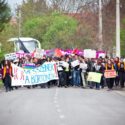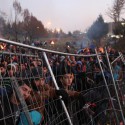Tag: self-organized activists
-

A report from an activist perspective on current protests in Hungary and Serbia
September 2015. Tens of thousands of people are on their way to Western Europe. Thousands are stuck at the Keleti train station in Budapest. On the 4th of September, in increasingly difficult conditions, they decide no longer to wait for the trains to take then on, but start walking towards their destination. As in the…
-
Conference: Transforming Willkommenskultur am 02.12.2016 in Kubiz
Transforming Willkommenskultur Refugees’ Standpoints on Solidarity, Activisms and Representation Am 02.12.2016 von 10.00-15.30 Kubiz Raoul Wallenberg – Aula Bernkasteler Str. 78, 13088 Berlin-Pankow *********English & العربية انظر للاسفل below********************************** Die Fachtagung Transforming Willkommenskultur: Refugees‘ Standpoints on Solidarity, Activims and Representation möchte die Perspektive von Migrant*innen und Geflüchteten in den Fokus nehmen. Im Gegensatz zu gegenwärtigen…
-
The Carnival Al-Ladji’in- 20 March 2016
The Refugee Club Impulse is happy to announce our new project – the Carnival Al-Ladji’in! On the 20th of march, we will bring our political demands on the streets, to fight for our rights! We want to show our culture and we want to show the people who we really are- trough an artistic and…
-

‘No-mans land’
In the last week(s) there has been an establishment of the ‘official corridor’ through the so called Balkan route. This intergovernmental agreement’s aim is to control the flow of people who are fleeing for a better life in Europe. Even though it may sound as an improvement, for the better fluctuation of people, it is…